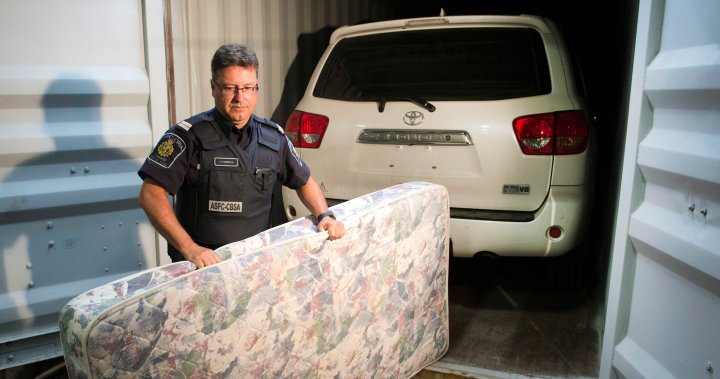Canada needs an “auto czar,” among other measures, to combat the problem of ongoing car thefts, industry officials say.
Representatives from Canadian automotive groups made those suggestions Thursday to MPs on the House of Commons’ public safety committee, which has begun a study into the problem of auto thefts.
“We need to ensure that, while funding announcements are appreciated, that action takes place quickly on this as cars are still being stolen every day,” said Huw Williams, national spokesperson with the Canadian Automobile Dealers Association.
“The violent crime that’s associated with them is taking place every day. We need a senior official appointed, almost like an auto czar, to make sure that CBSA and some of the other departments are brought together to do things differently. Doing it the same old way is not going to get it done. We need a new way of addressing organized crime.”
Canada becoming a ‘source nation’ for auto theft
Experts have warned that Canada is quickly becoming a “source nation” for vehicle theft and resales, often with the involvement of organized crime groups.
In Quebec and Ontario, reported vehicle thefts increased by roughly 50 per cent in 2022, alongside a 35 per cent increase reported in Atlantic Canada.

The issue was the subject of a summit in Ottawa this month, bringing together politicians, law enforcement and industry representatives to figure out a unified response.
The federal government recently announced an additional $28 million for the Canada Border Services Agency (CBSA) to improve the agency’s ability to detect and search shipping containers used to transport stolen vehicles overseas.
Ottawa also pledged an additional $15 million over three years to fight the issue, with $9 million going towards police services to increase their capacity to take custody of stolen vehicles identified by the CBSA.
Prime Minister Justin Trudeau and his cabinet ministers have also suggested they’re open to stiffer criminal penalties for repeat offenders or those connected to organized crime caught stealing vehicles.

However, the issue still persists. Since the federal auto summit on Feb. 8, more than 3,000 vehicles have been stolen, OPP Comm. Thomas Carrique, who was representing Canadian Association of Chiefs of Police, told MPs.
Auto thefts are “leaving a stain” on Canada’s trading reputation, said Damon Lyons, executive director of the Canadian Vehicle Exporter’s Association.
Breaking news from Canada and around the world
sent to your email, as it happens.
“Our reputation on the international stage is paramount to our collective success in the automotive industry. For well over 40 years, Canada has been known around the world as the most trusted nation to do business with and source vehicles from the international market,” he told MPs.
“When organized crime threatens killing citizens and businesses, it is incumbent upon the government to root out organized crime so that Canada can regain its rightful place as a leader in trusted international trade.”

Lyons suggested investments in artificial intelligence could help border officials assess shipments before they leave a port.
“There are vast sums of data which come into that service portal, and it’s just not possible for five people or 100 people to go through that data,” he said.
“If the CBSA takes part of this $28 million and we apply that to intelligence targeting on those export declarations, they have an idea of what containers they should be looking at.”
Are vehicle makers doing enough?
David Adams, president of the Global Automakers of Canada, told MPs that car manufactures are “constantly reviewing” and updating their “security systems,” but are facing increasing odds against “sophisticated” international organized crime rings.
“We’ve been meeting with Amazon and other online platforms to discuss the reality that the tools and devices with apparently no other legitimate purpose other than to facilitate auto theft are readily available on their platforms,” he said.
“We don’t have all the answers by any means, and auto theft is a very complex problem for which there are no quick fixes or silver bullets. However, we do believe that there are some short-, medium- and longer-term initiatives that could be undertaken to address the other problem plaguing our country right now.”

Adams added that for example, automakers are working on improving key fobs so that when they are stationary, its transmission signal is cut off, eliminating the opportunity for thieves to hijack it and steal the car.
He said automakers are also looking at creating a digital geofence around a vehicle, so that if it moves beyond a certain radius, such as a home, the owner will be notified.
“Technology is constantly evolving in vehicles, it’s constantly being improved and hardened against vehicle theft,” Adams said.
“No automaker wants to have their vehicle on the top 10 list of stolen vehicles because it’s a black mark against their reputation. We’re working diligently to address the technology in vehicles on a daily basis.”
Vehicle thefts have spiked since COVID-19 pandemic
Carrique said the supply chain disruption sparked by the COVID-19 pandemic is a driving factor behind the rise of vehicle thefts.
It “led to a shortage of vehicles and vehicle parts, substantially impacting supply and demand, and thereby dramatically increasing the value of used vehicles,” he told MPs.
“It’s estimated that 80 per cent of passenger vehicles are exported, 10 per cent of these vehicles are re-vinned and sold domestically, with the remaining 10 per cent being chopped down and sold for parts.”
“Re-vinning” is when a vehicle identification number (VIN) is changed, and then sold back to another person who has no idea of the vehicle’s origins
Carrique added that police leaders are calling for stronger port security and monitoring mechanisms, enhanced industry regulations, and the creation of a national system for vehicle registrations specific to the theft of motor vehicles.
He also said police are seeking stronger minimum sentences for repeat offenders, and the creation of new offences related to trafficking and/or exporting stolen vehicles, while exercising the availability of the full range of current criminal penalties.
— with files from Alex Boutilier and Touria Izri




